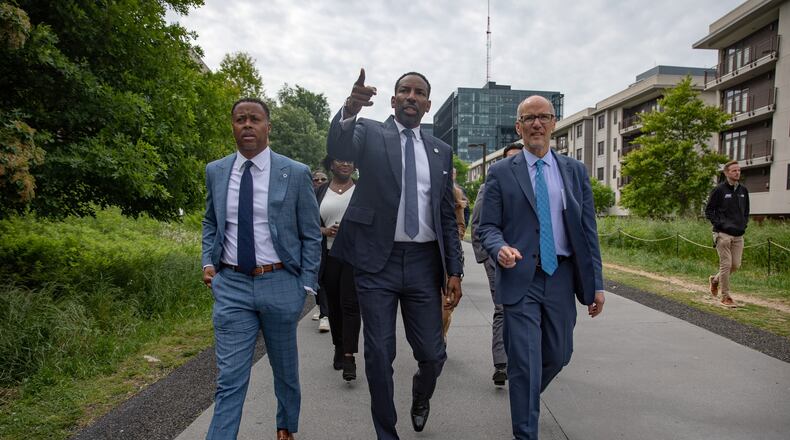Atlanta officials announced Wednesday that they’re speeding up delivery of miles of trails on the southside of the Beltline.
The ramped up timeline — made possible by the help of millions in federal funds — is part of a massive effort to finish paving 18 miles of the trail loop before the highly-anticipated FIFA World Cup in 2026.
Standing in the shadow of the city’s skyline and just a short walk away from the iconic Ponce City Market, Atlanta Mayor Andre Dickens and Beltline, Inc. President and CEO Clyde Higgs joined White House Senior Advisor Tom Perez to tout the federal funding that made the accelerated construction timeline possible.
“Atlanta is a city once divided by infrastructure and segregation,” Dickens said. “The Beltline is a game changer though, reconnecting communities that were once marginalized and in the process breaking down long standing barriers.”
Credit: Riley Bunch/riley.bunch@ajc.com
Credit: Riley Bunch/riley.bunch@ajc.com
The city is expecting an influx of millions of visitors for eight World Cup games including a semi-final match. Officials have compared the scale of the event to hosting eight Super Bowls or eight SEC football championship games.
Beltline officials said that when the games come to town, nearly 16.3 miles of the Beltline’s main trail as well as 1.6 miles of the westside connector — which provides a pedestrian path from Washington Park directly to Mercedes-Benz Stadium — will be completed months ahead of schedule.
The full 22-mile main trail is still on track to be fully completed by 2030 — a feat that was hard to think possible just a few years ago.
Credit: Courtesy of the Atlanta BeltLine, Inc
Credit: Courtesy of the Atlanta BeltLine, Inc
“Imagine being able to jump on a bicycle, or scooter or, if you’re ambitious, you literally will be able to walk from Piedmont Park all the way to Washington Park on the westside,” said Higgs, who added that small businesses along the trail will have greater opportunity for foot traffic during the international sporting event.
In June of last year, Atlanta received the largest federal grant in the Beltline’s history of $25 million to speed up construction along certain portions of the trail loop. Perez said Wednesday that too many infrastructure projects across the country divide communities instead of closing equity disparity gaps.
“Redevelopment that brings communities together — which is exactly what you’re doing — that’s what investing in America, that’s what investing in Atlanta, that’s what investing in Georgia is all about,” he said.
Beltline leadership said Wednesday that construction of the trail system also includes laying infrastructure groundwork for future installation of transit along the path, but whatever that may look like is still undecided.
Debate over the long-standing plans to install light rail along the Beltline has exploded after the mayor announced his intention to build four new MARTA infill stations across the city. Beltline rail opponents speculated that the news is the first-term mayor backing away from light rail.
But Dickens has consistently said he still supports integrating transit into the trail loop — even if that’s not rail.
“We are very focused on making sure that we continue to move down a path of having transit along the Beltline, that’s my interest and that’s my goal,” he said. “I want folks to be clear about that because it seems like there’s some uncertainty about where my interests lie.”
Last week, Dickens suggested alternate modes of transit for the Beltline like driverless “pods” instead of rail.
Credit: Riley Bunch/riley.bunch@ajc.com
Credit: Riley Bunch/riley.bunch@ajc.com
About the Author
Keep Reading
The Latest
Featured






